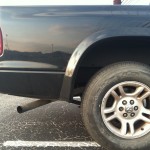New Chemical Safety Guidelines Issued In Wake of West Fertilizer Explosion
VIDEO: The First Festival in West, Texas Since the Explosion
After a deadly explosion at a fertilizer plant in the town of West, Texas this April that killed 15, the federal government issued updated recommendations for the safe storage of ammonium nitrate Friday.
The recommendations, known as a chemical advisory, had not been updated since 1997. The new guidelines warn that ammonium nitrate can become “much more likely to explode” under conditions like those found at the fertilizer plant in West and other facilities in Texas.
But the advisory is just that — advice. It is not a regulation itself, according to the Environmental Protection Agency (EPA), and “cannot and does not impose legally binding requirements on the agencies, states, or the regulated community,” the agency says. Rather the purpose of the advisory is to “raise awareness” and “share lessons learned from past incidents.”
Ammoniun nitrate can explode “when stored near other material that can add fuel to the ammonium nitrate — such as grain, sugar, seeds, sawdust, and most especially petroleum fuels such as diesel,” the advisory says. It adds that “the presence of fuel and/or heat (and especially both) near ammonium nitrate is a very high hazard situation,” especially when stored in confined spaces.
The plant in West stored ammonium nitrate in wood buildings, and had no sprinkler system.
The updated advisory notes that the U.S. produces millions of tons of ammonium nitrate a year, with incidents being rare. But when they do occur, the advisory says, “they can have severe consequences.” Two such incidents occurred in France in the early 2000s, when ammonium nitrate stored in bulk exploded killed over 50 people, including several first responders. (Of the 15 people killed in West, 12 were first responders.)
After several incidents in the first half of the 20th century, including the Texas City ammonium nitrate disaster of 1947 that killed nearly 600 people, the industry adopted new standards for storing the chemical, like no longer using wax coatings for the chemical or breaking up caked ammonium nitrate with explosive materials.
The advisory says that in the wake of the West explosion, these new measures “should become common practice in the industry and emergency response community in order to prevent the catastrophic loss of life and property damage.”
Among the new recommendations:
- Avoid storing ammonium nitrate in a confined space.
- Store ammonium nitrate in buildings with sprinkler systems, “or have an automatic fire detection and alarm system if the areas are not continuously occupied,” the advisory says. “This is especially important when the facility in question is close to the public surrounding the facility.”
- Do not store ammonium nitrate in wood buildings or storage bins.
- “Dust-producing organic materials, such as grain, seeds and sugar, should not be stored
near ammonium nitrate,” the advisory says. “Some metal powders such as aluminum powder are equally dangerous.” - Local fire departments should visit ammonium nitrate facilities and review how the chemical is being stored. (This may be easier said than done. According to a report by the Associated Press last week, five ammonium nitrate facilities in Texas have refused access to fire marshal inspectors since the West explosion. Texas has no state fire code.)
- Based on those inspections and information submitted by the facilities to come up with an emergency response plan, and share that plan with local communities. While facilities storing bulk quantities of ammonium nitrate are required to tell local emergency planning committees about the danger the chemical presents, the advisory notes that doesn’t always happen. It suggests that first responders reach out to facilities in their communities, which tend to be agricultural businesses like farm co-ops and crop service operations.
- When firefighters and first responders are called to a fire at an ammonium nitrate facility, they should “first consider if they can safety fight the fire or whether they should just let it burn, move to a safe location, and focus on evacuating nearby residents.” If they do decide to fight the fire, they should do so from “protected locations or maximum possible distance.”
“If ammonium nitrate is stored safely or if alternatives are used, explosions could have been prevented in the past and more explosions could be prevented in the future,” said Senator Barbara Boxer (D-CA), Chairman of the Environment and Public Works Committee, who has been pushing for more oversight of chemical facilities like the one in West.
President Obama has also called for other measures to increase safety and oversight at fertilizer facilities. In an executive order signed last month, Obama asked for more information sharing and best practices for ammonium nitrate storage, including the updated chemical advisory.

